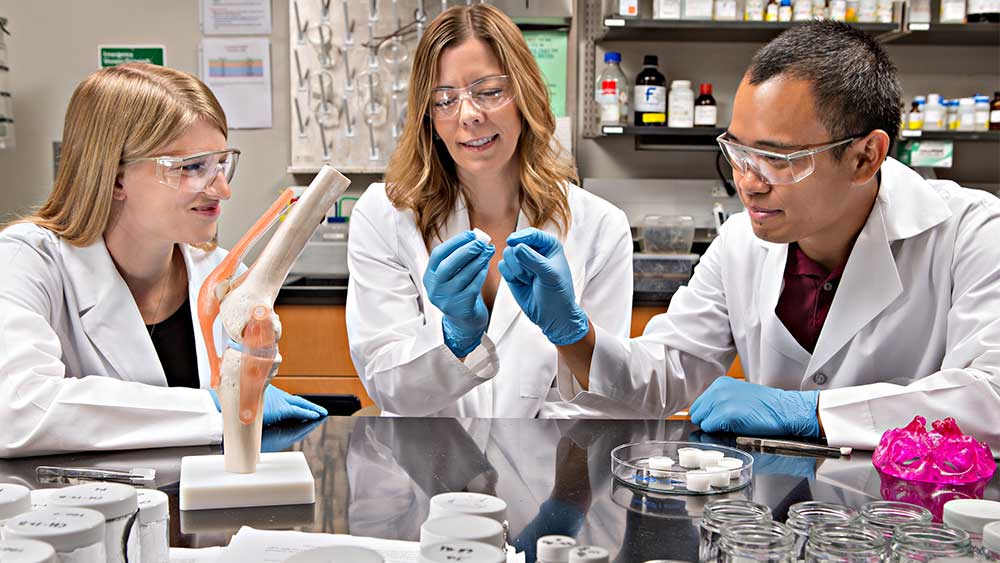
What is the Health Care Industry?
Engineers work in many roles within the health care industry. Whether you want to help develop life-saving medicines, develop hardware to monitor a patient's well-being, or work as a physicianeer, the options are endless.
Majors that Could Lead to Health Care Careers
Students interested in health care careers could start their career paths through several majors offered by the Texas A&M University College of Engineering.
See below for a list of some of our majors that could lead to a health care career.
- Biological and agricultural engineering: Biological and agricultural engineers design bioreactors, fermenters and other systems for the production of pharmaceuticals and food supplements.
- Biomedical engineering: The biomedical engineering department brings about multidisciplinary biomedical research. It serves the growing biotechnology and biomedical device industry via technology transfer and workforce education. Through sponsored projects, internships and class projects, the biomedical program prepares students to work with physicians and life scientists to solve a wide variety of medical and biological problems.
- Chemical engineering: Chemical engineers in the health care sector work to advance genetic testing and gene therapy procedures by studying and applying chemical principles to these methods. They also work to engineer organisms and microorganisms that can be used in applications like degrading wastes and converting chemicals into more useful ones. Related to the health care sector is the pharmaceutical industry, where chemical engineers might create new medicines or synthetic versions of existing medicines, or use bacteria, animal and plant cells to help them understand diseases, disease pathways and human responses to drugs.
- Computer engineering: Today's medical devices involve a combination of patient monitoring, respiration, etc., and can be seen as embedded systems. Computer engineers are important for the process of programming these embedded systems so that they can be used in the medical field.
- Computer science: Computing professionals use software engineering to make the jobs of healthcare professionals more efficient. Computing professionals improve remote health applications, tools to monitor how people respond to healthcare systems.
- Electrical engineering: Electronic hardware is commonly used in medical devices that involve patient monitoring, respiration, etc. Electrical engineers are vital for designing and improving this hardware so that these medical devices are effective and continuously improving.
- Electronic systems engineering technology: Students majoring in electronic systems engineering technology will gain knowledge and experience needed for the design of biomedical instrumentation systems used to monitor human vitals.
- Industrial and systems engineering: Industrial engineers design systems that are centered around people and proper ergonomics. Using health-centered design, they improve facilities and products to help support consumers' health.
- Industrial distribution: Industrial distribution majors are vital for sales and operations roles in the medical field. Some primary areas in which industrial distributors find jobs are pharmaceutical products, medical devices, home health care and medical supplies distributors.
- Materials science engineering: From health monitoring (e.g. lightweight, low-power, wearable sensors), to tissue scaffolding, to personalized prosthetics (e.g. additive manufactured hip stems), new materials are critical. Material science engineers play a large role in creating these new materials and ensuring that they are both safe and effective.
- Mechanical engineering: Mechanical engineering students may find a career in which they design and develop diagnostic equipment, surgical methods (including robotic devices and monitoring equipment), sterilization systems, patient devices (such as sleep apnea machines, diabetic pumps and monitoring systems and cochlear implants), health care apps (to assist patients with finding and managing care), and logistical analysis for optimal use and scheduling of hospital resources.
- Multidisciplinary engineering: The health care industry needs to meet the growing demand for trained engineers who are able to apply the principles of engineering, health sciences and business administration. Multidisciplinary engineers are more likely to have this combination of expertise, and are therefore often a good fit for the health care career field.
- Multidisciplinary engineering technology: Embedded systems, robotics applications in health care and diagnostic devices are important aspects of the health care career field. Students in this major take classes that provide them with ample knowledge and experience to pursue jobs that have a focus in one of these topics.
- Nuclear engineering: Radiation detection, dosimetry, radiology physics and health physics play a prominent role in the medical field, and nuclear engineers are a great fit for careers in these topics. Health physics is the discipline responsible for protecting humans and their environment from the harmful effects of ionizing radiation while still providing for its beneficial uses. Health physicists may find careers in areas such as radiation safety programs, medical physics and public health.
- Ocean engineering: Ocean engineers are responsible for the development and harvest of undersea plant and marine organisms for pharmaceuticals — an important frontier for modern-day medicine.